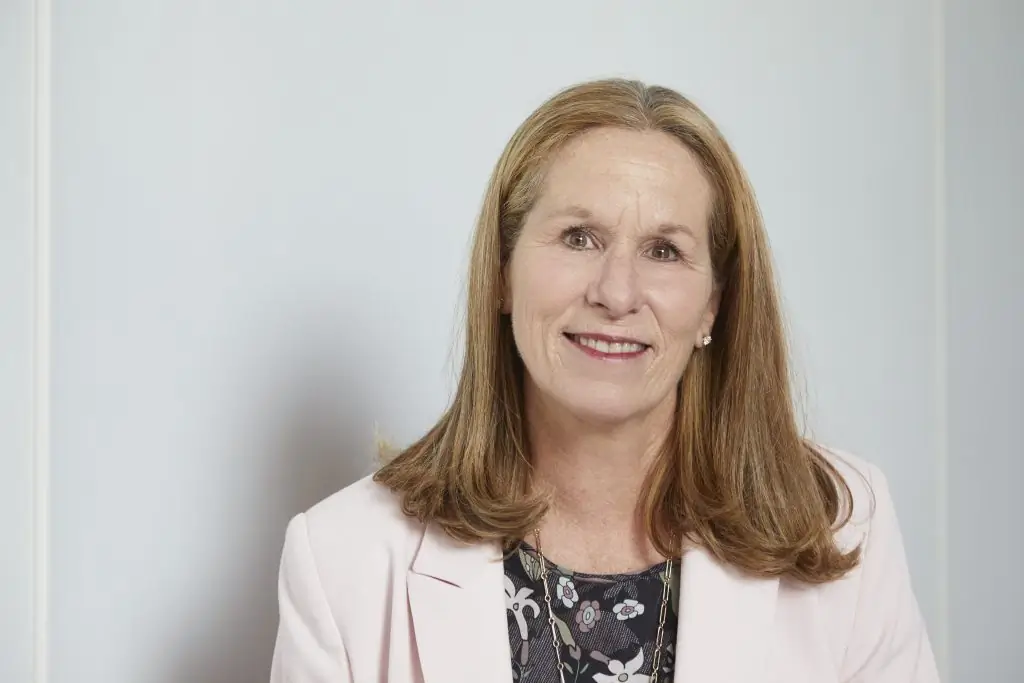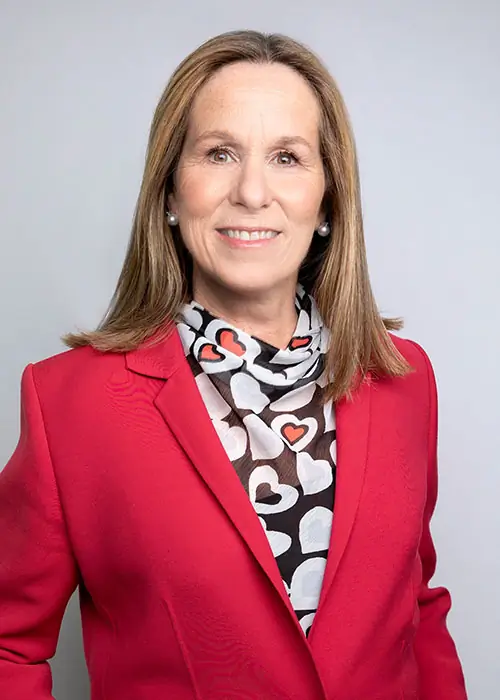Jennifer Tory — business trailblazer and one of Canada’s most powerful women
Jennifer Tory spent four decades with the Royal Bank of Canada. This career saw her scale a dizzying series of heights, retiring as RBC’s Chief Administrative Officer, being named to the Order of Canada, and being named one of Canada’s most powerful women.
In this episode, Jennifer joins Jen and Catherine to discuss the changes that still need to take place in corporate offices and boardrooms to ensure accurate equity and diversity, the decisions she made that allowed her to hold a significant job while raising two successful daughters, and her advice for other women who want to go there and do that.
Note: This transcript has been edited for clarity and length.

Taking risks and building confidence
Jennifer Stewart: You were the first woman to lead a business platform within RBC. What did that mean to you personally and professionally?
Jennifer Tory: I was, first of all, not necessarily aspiring to that. Like many women, I probably had that confidence gap, where you go through the checklist and say, “Okay, could I ever aspire to that job?” I might have ticked a few of the boxes and had a few of the boxes where I said, “Oh, no, I’m not ready.”
I have a great story about that. Janice Fukakusa, a trailblazer, was our CFO for 10 years. After my promotion was announced, she said, “Let’s go to lunch.” And she said, “I know: You’re thinking about all the things you don’t know instead of all the things you’re going to bring to the job.” That really helped me reset how I was going to approach settling into the job.
The most important thing for me was that for women at RBC, it was a really meaningful occurrence that a woman would be put, not just as the head of a business but as the head of the largest business at RBC.
Jennifer Tory
And so, as a result, I took a lot of pride in continuing the work that I was doing in terms of identifying women across the bank now because I had a broader purview, to be able to chat with them and have them participate in roundtables that I might have put together.
Catherine Clark: Do you think we’ll ever reach a stage where women don’t second guess themselves when given that promotion or being asked to take on a leadership role?
Jennifer Tory: I don’t know. It’s a great question! I spend a lot of time building the confidence of women that I’ve mentored. Men, too, but it’s much more prevalent in women. There’s something humble about it, but at the same time, we hold ourselves back. And that’s what we have to work on, is how do we encourage women to take the risk.
When I give career advice, one of the things that I focus on is how to encourage women, in particular, to take those risks earlier in their careers so that they tackle challenges that they might think are beyond them.
Jennifer Tory
So then when the next one comes along, and it might be even bigger, they’re better equipped. They know how to quell that anxiety that potentially creeps into their psyche when they’re looking at an opportunity and say, “Okay, well, I tackled something that was similarly difficult before and here’s what I drew on and here’s how I went about making myself comfortable.” We, as women, need to support each other to think differently early in our careers to be able to prepare the way for those bigger challenges down the road.
Driving your life instead of being a passenger
Jennifer Stewart: You raised two daughters as well. What advice do you have for mothers navigating the workplace that want to climb the ladder but want to be present for their children as well?
Jennifer Tory: This is one of my favourite questions, and whenever people frame it as work-life balance, I correct it. I don’t think you can describe it as balance. But you can definitely describe it as choices. For the most part, I tried to choose the most essential items in my daughters’ lives. I made sure that I could put things in my calendar ahead of time so that I didn’t miss them.
Whenever people frame it as work-life balance, I correct it. I don’t think you can describe it as balance. But you can definitely describe it as choices.
Jennifer Tory
I have another early career story. When I was offered my first executive role, I had recently separated from my then-husband, the father of my two daughters, and they were very young. They were three and eight. And I was offered my first executive posting, but it was a fairly lengthy commute. I decided that for once I would listen to the voice in my head and would turn it down for family reasons, not for career reasons, because I knew I would do neither job well. I’d be stressed with the commute, and also taking on too much when I was newly separated and was trying to navigate being a single mother of two young girls.
I had to have the confidence that another opportunity would come my way. And it did; it didn’t come right away. It came a few years down the road, but that was okay, because at that stage, I was ready for it. I was more settled. That’s what I mean by choices. You have to have the courage of your conviction and drive your life and not be a passenger; you have to be able to drive those things that are going to feel right and not constantly be wracked with guilt or feel that you’re letting someone down.
Jennifer Stewart: You give enormous time to nonprofit organizations like Sunnybrook Health Sciences Centre or TIFF, whose board you chair. Why do you do it?
Jennifer Tory: This is where my mother would come in. My mother was a pillar of community work. She didn’t work. She wished she had had a career. She’s still going strong at almost 90. But if she could have traded her life, she would have loved to have a career. So very early on I embraced community work. I was a candy striper at Sunnybrook Health Sciences Centre – that’s how early I started there.
And part of the secret I have told many who have asked is to always choose something you are passionate about. As much as RBC is Canada’s most generous philanthropic company, and their corporate social responsibility is above and beyond, I didn’t have them choose my community work. I chose my community work, chose it early, and I also navigated to places that I wanted to participate in, even if they weren’t boards but were fundraisers that I wanted to be involved with to support the community. If you pick something you’re passionate about, you’ll feel you’re not taking time away from something else, number one.
Number two, you’re feeding that part of yourself that wants to feel that what you’re doing has a meaning beyond your paycheque or the company you’re with. It builds a network outside of your job, which for women in particular is incredibly important. One of the for-profit boards that I am fortunate to be on now, part of the reason I was asked to join was that a couple of the board members were people I’d sat on not-for-profit boards, which is how they would know me. And they would also know my capabilities a little from that experience. And so those are kind of my important reasons why.

Making corporate boards more gender-inclusive
Catherine Clark: You do sit on several corporate boards, and it’s a space that has seen a huge amount of pressure recently to become more diverse and gender inclusive. What have you seen change?
Jennifer Tory: What I’ve seen change is the commitment. I firmly believe there is a much greater commitment there. I just wish we could speed it all up. There’s also a greater focus on ESG. Investors are now noticing companies where they don’t have a diversity lens on their board or among their executives. But as I said, the speed is still a bit troublesome. And there’s still a bias to looking for CEOs, not necessarily valuing some experiences that may be just as valuable. And as we all know, that’s where a tremendous amount of work still needs to happen because there are so few women CEOs in Canada of public companies – lots of private, but even then, ones we don’t know about. So, we don’t necessarily search widely enough.
Catherine Clark: How do you recommend that women self-identify that they’re interested in serving on a board?
Jennifer Tory: First of all, most firms now have a focus and have people whose responsibility it is to find more women for board opportunities. Don’t wait for them to reach out to you. Quite honestly, I haven’t had a lot of reachouts from recruitment firms. I’ve had reachouts from my network, from executives I knew before or chairs of boards.
And so proactively reach out to those firms and understand what they would be looking for. They will help women understand what they would need to do to enhance their competitiveness for boards. The first message they’ll give you, depending on your experience, is to sometimes start a little smaller. And then once you have one public company, it will help you get the next one, and so on.
Reach out proactively to firms. Build your network, cast a wide net, and look for people you know on boards in industries you might be interested in. It’s surprising who you will have run into if you’re in the community. And just like I mentioned earlier, people know you from community work, or you went to school with them or something. So, cast a wide net, and don’t be too picky about the industry initially. If you know women on boards, if they know you well, ask them to put you on the list for the company they’re a board member of. Because there might come an opportunity where that board is looking for additional women and you could have someone sponsor you for a board seat. There are still many opportunities where boards have just one or two women, and so they’re always looking. They’re constantly looking now.
Jennifer Stewart: The pandemic has been hard on women; a lot of them have stepped out of the workforce. We have coined the term “she-cession.” What lessons do you think companies have learned from this experience? And how can we build workforces that better support women moving forward, learning from this pandemic experience?
Jennifer Tory: We need to build more flexible work arrangements. I think one of the challenges we’re having is the fact that there are still a lot of job opportunities that can’t be filled right now because people have decided they are not going back to going to an office five days a week. But one of the challenges is that there are going to be workplaces where you’ll still need to come, not every day, but certainly a good percentage of the time. Conveying flexibility but at the same time coming up with arrangements that suit the employer and the employee: that’s going to be one of the most important things a company can communicate.
What is their position on work from home, and what do they expect when someone’s working from home, and what jobs lend themselves to working from home? There are jobs that will not lend themselves to working from home because they have to work very closely with other people and different departments. Collaboration is the hallmark of successful big companies, and I have talked to many people who feel it has suffered a bit during the past year and a half. And so that would be the first thing.
The second thing is, again, put your hand up. If there’s some specific issue, work with your employer to come up with a solution. If you’re one of those valued employees, they are going to try and find something that will work for you. But often, a woman will say, “I can’t ask for that. They won’t say yes,” before they’ve even asked. And that will be the other challenge: how do you put your hand up and what’s reasonable? You have to test it. It’s a whole new world now. We’ve tested everything in the past year and a half with everybody working on Zoom. I don’t think anybody really wants to do that all day, every day. That’s not a good way to have to work all the time. But again, it’s about being honest about what’s going to work.
Look for your passion. If this job doesn’t give you the flexibility you need, you still want to pursue your passions in a career that you choose. A lot of women are taking a break from the job that they were in, but it doesn’t mean they don’t want to work. It’s more that they haven’t figured out how to navigate this new world.








